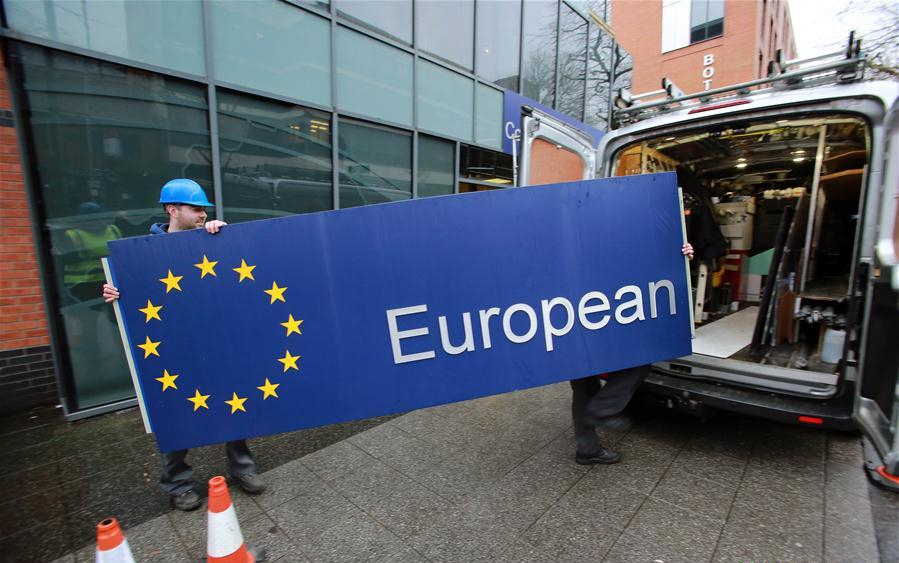
Pro-Brexit supporters celebrate Brexit outside Stormont in east Belfast, Northern Ireland, Britain, January 31, 2020. /Xinhua Photo
Pro-Brexit supporters celebrate Brexit outside Stormont in east Belfast, Northern Ireland, Britain, January 31, 2020. /Xinhua Photo
Editor's note: Richard Fairchild is an associate professor at the University of Bath School of Management. The article reflects the author's opinions and not necessarily those of CGTN.
January 31, 2020, was a momentous moment for the UK. After three tough years of negotiations and bargaining between the UK and the EU, and many failed attempts, the UK finally achieved Brexit and left the EU. As the bells rang, and fireworks exploded at 11 p.m. to mark Brexit, the upbeat party mood across the country suggested that the job was now done.
In reality, the months ahead will be tough. Now that the UK has left the EU, the UK needs to negotiate new trade deals, both with the EU and with trading partner countries outside of the EU. Under the terms of Friday's withdrawal, the UK is required to abide by EU's trading rules for the next 11 months. Thus, having left the bloc, the UK has until December 31, 2020, to negotiate a trade deal with the EU.
We recall that, throughout last year, there was a huge battle in the House of Commons over Prime Minister Boris Johnson's threat to take us out without a deal. The Benn Act was introduced to stop us from crashing out without a deal on October 31, 2019. Then again, Labour refused to agree to a December 12 general election unless a no-deal Brexit was taken off of the table. There were mixed opinions between commentators and analysts as to whether a no-deal Brexit would be good or bad for Britain.
Well, in my opinion, the possibility of a no-deal Brexit (on December 31, 2020) is firmly back on the table. If Britain has not agreed with a trade deal with the EU by December 31, then, by the terms of the Withdrawal Agreement, Britain leaves without a deal on that day. We then revert to WTO rules.
Indeed, According to the BBC News (February 3, 2020), Prime Minister Johnson has stated that there is no need to follow the rules of Brussels on trade. The prime minister will call for a Canada-style agreement between the UK and the EU. He will threaten to walk away if such a deal is not agreed on by the EU. In the EU-Canada deal, most tariffs on goods imported between them have been eliminated. This is Boris Johnson's vision for an EU-Britain deal.

Workmen remove the signs at the European Commission in Northern Ireland office in Belfast, Northern Ireland, Britain, January 31, 2020. /Xinhua Photo
Workmen remove the signs at the European Commission in Northern Ireland office in Belfast, Northern Ireland, Britain, January 31, 2020. /Xinhua Photo
The Irish Prime Minister, Leo Varadkar, told BBC News that a Canada-style agreement with the UK was possible, but then said, "Canada isn't the UK, and there is a need for common rules and standards." Furthermore, the EU has effectively ruled out a Canada style zero-tariff agreement between Britain and the EU. Ursula von der Leyen, president of the European Commission, has stated that negotiations would be "hard and fair and fast." However, she added that, if Britain wants to remain close to the EU bloc, then Britain would have to abide by its rules.
Johnson is prepared to revert to the WTO rules. He has said that it is emphatically not a choice between deal or no-deal: instead, Britain's choice is between our proposed Canada-style agreement or walking away with an Australian-style agreement. However, acting Liberal Democrat Leader, Sir Ed Davey, has called the Australian-style alternative a "no deal in all but name... deliberately hollowing out our trade is nothing short of a scorched earth policy for our economy."
In my opinion, we can analyze all of this in terms of bargaining theory. As we have now left the EU, this is now really a bargaining game between two parties, the UK and the EU.
Before January 31, 2020, Britain was negotiating from within the EU: We were still effectively, in the "club". Now, January 31 has marked a symbolic separation: it is clear that we are now adversaries in our negotiations with the EU.
We can now try to exercise our strength, and brinkmanship, by threatening to walk away without a deal if we don't get our way. In bargaining games, the threat of walking away without a deal is very powerful, if the threat is credible.
Is Britain's threat credible? If we do not get the Canada deal, will we throw away the EU deal, and revert to complex and painful WTO rules? Furthermore, bargaining theory demonstrates that, with a long deadline, we can continue to threaten to walk away, without actually doing so, to try to get our deal, until the final deadline day of December 31, 2020. It is unclear at that point whether Britain would walk away with no deal.
In my opinion, a further irony here is that, now that we have separated from the EU, and are symbolically more adversarial, Prime Minister Johnson is now demanding a Canada-style zero-tariff agreement with the EU, which is a kind of cooperative free-trade agreement between friends.
Canada and the EU negotiated that agreement in precisely that spirit. By being in the EU and then leaving acrimoniously, friendly relations between the EU and Britain have been stretched and damaged. Now Britain is asking for a Canada-style friendly agreement! Emotionally and psychologically, the EU is not likely to "play ball."
We have already seen the difficulties of negotiating mutually beneficial low tariffs in the U.S.-China trade tariff wars. Are we likely to witness similar tariff escalations between Britain and the EU in the future?
(If you want to contribute and have specific expertise, please contact us at opinions@cgtn.com.)